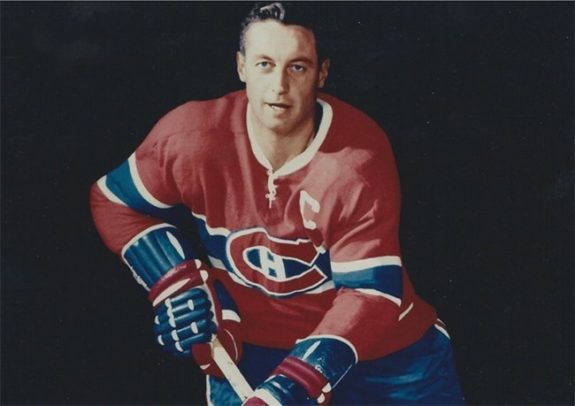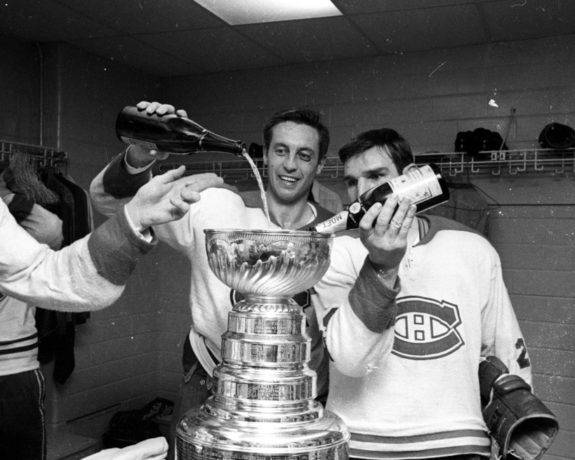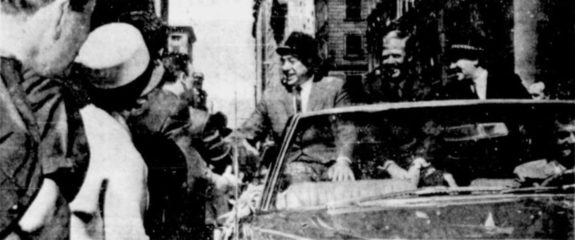The Montreal Canadiens won four out of five Stanley Cups from 1964-65 through 1968-69. The Hockey Hall of Fame called the Canadiens of the late 1960s the “forgotten dynasty” because of the amount of historical attention paid to the franchise’s great dynasties of the 1950s and late 1970s. However, it was during the late ’60s that they fielded the deepest roster in league history and overtook the Toronto Maple Leafs as the NHL franchise with the most Stanley Cups, a record they have held ever since. They also impacted the NHL in innovative ways that have lasted into the modern day.
The pinnacle of this great dynasty came during the 1968-69 season. Veteran legends Jean Beliveau and Henri Richard teamed up with young stars Yvan Cournoyer and Jacques Lemaire as part of one of the most star-studded NHL rosters ever assembled, made up entirely of players born in Canada. A total of eleven future Hockey Hall of Famers suited up in a Canadiens uniform that season, just one shy of the NHL record held by the 1936-37 Boston Bruins.
Toe Blake’s Retirement Leads to Record-Breaking Season in Montreal
The most drastic change the Canadiens made during the 1968 offseason came behind the bench. Legendary head coach Toe Blake retired after winning his eighth Stanley Cup in Montreal in 1967-68. Claude Ruel took over as the youngest coach in the NHL at age 29, faced with the tall expectations of succeeding a hockey icon.
Blake set Montreal franchise records for both wins and points during his first season in Montreal in 1955-56. However, Ruel wasted no time making his mark and immediately surpassed Blake’s regular-season accolades in his first season. The 1968-69 Canadiens broke the existing NHL records for most points in a season with 103, previously held by the 1950-51 Detroit Red Wings, and most wins in a season with 46, previously held by Blake’s 1955-56 team. Both marks were set in the final game of the regular season against the Bruins, who also had a chance to earn the East Division’s top spot with a win.

Cournoyer, a 5-foot-7 right-winger nicknamed “The Roadrunner,” led the way offensively with 43 goals and 44 assists in 76 games played. He played most of the season on the top line with Lemaire and Dick Duff. The blue line was anchored by Serge Savard, who solidified himself as the team’s top defenseman, and former Norris Trophy winner Jacques Laperriere. Beliveau, the team captain who finished second to Phil Esposito in the Hart Trophy voting, was known as a classy leader who helped develop the team chemistry that made this talented group of individuals into a dynasty.
The Canadiens were anchored by three future Hall of Fame goaltenders during the 1968-69 season. Emerging 23-year-old Rogatien Vachon played 36 games between the pipes, while veteran Gump Worsley played in 30. Even with this tremendous duo who had shared the Vezina Trophy in the previous season carrying the load, 25-year-old rookie Tony Esposito made his NHL debut and played his first 13 NHL games with Montreal. This seemingly inconceivable trio helped the Canadiens to their 26th consecutive season below the league average in goals. Montreal’s astounding streak would eventually reach 61.
Road to the Stanley Cup
After steamrolling the New York Rangers in an opening-round sweep in the 1969 Playoffs, the Canadiens met their toughest test of the year in a second-round series against the Bruins. Their victory in the regular-season finale ensured that the first two games of the highly anticipated matchup would be played at the newly renovated Montreal Forum. The Habs took the series lead in dramatic fashion with an overtime goal from Ralph Backstrum in Game 1. They trailed Boston late in Game 2 but rallied thanks to a goal from Serge Savard with 1:09 left in regulation and an overtime winner from right-winger Mickey Redmond.
The Bruins rebounded on home ice with an emphatic 5-0 victory in Game 3 and evened the series with a 3-2 win in Game 4. The Canadiens again won at the Forum in Game 5. On April 24, 1969, one of the greatest games in Canadiens history was decided by a heroic double-overtime winner off the stick of Jean Beliveau that gave the Habs a berth in the Stanley Cup Final for the 15th time in 19 seasons.
The upstart St. Louis Blues won the West Division, widely considered inferior to the East, for the second consecutive season since its creation as part of the NHL expansion of 1967. Led by 35-year-old coach Scotty Bowman, the Blues had put up a more formidable fight than expected against East Division opponents during the regular season. They rode Vezina Trophy co-champions Glenn Hall and Jacques Plante to consecutive sweeps in the opening rounds of the 1969 Playoffs. Although Boston had seemed like their most daunting competition, Montreal knew not to overlook the impressive track record of the 40-year-old Plante, a six-time Cup champion with the Canadiens.

The Canadiens squashed any hopes of an expansion franchise challenging their dominant reign as the NHL’s best. They swept the Blues in the Stanley Cup Final for the second consecutive season and captured the franchise’s 16th Cup. The Canadiens dominated the overmatched Blues with “infinitely more scoring and a more mobile defense” (Blues Sing a Happy Tune Until Habs Shut ‘Em Up, The Hockey Chronicle, 2003). They won the first two games at the Forum by identical scores of 3-1. They followed with a 4-0 blowout and a 2-1 series clincher in St. Louis.
Vachon continued his superb play in net with only three goals allowed through the entire series. He started all four games while Plante and Hall alternated for St. Louis. Serge Savard was named as the Conn Smythe Trophy winner after recording four goals and six assists in 14 games played. He was the first defenseman ever to win the award.
Legacy of a Dynasty
As stated by the NHL’s Stanley Cup Film series, Montreal’s “ability to function as a team was never better demonstrated than it was during the 1968-69 season.” They blended the talent of offensive stars Beliveau and Cournoyer, top defensemen Savard and Laperriere, an unmatchable tandem of three Hall of Fame goaltenders, and complementary checkers Claude Provost and John Ferguson. Ruel was able to synergize the unique collection of talent into the ideal blend of chemistry for the perfect climax of the Montreal Canadiens’ dynasty of the late 1960s.

Aside from the historic collection of Hall of Fame talent assembled, the success of the front office transcended its time and legitimized the lasting legacy of the 1968-69 Montreal Canadiens. General manager Sam Pollock succeeded the legendary Frank Selke in 1964 following the four-year demise of Montreal’s dynasty of the late 1950s. His ability to “consistently reinvigorate the line-up with great players so that the team never suffered a lull from being in a re-building mode” led to the sustained success of the Canadiens throughout the next decade. His model exemplified the ultimate goal of team building in the NHL through the following decades and into the present day.